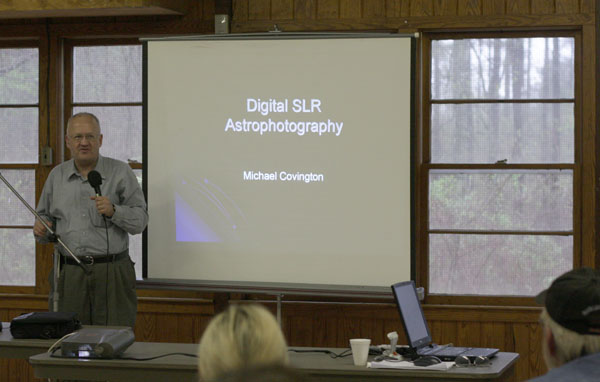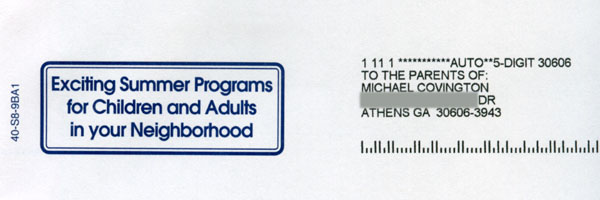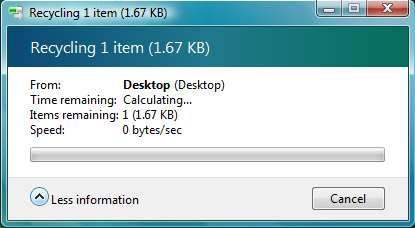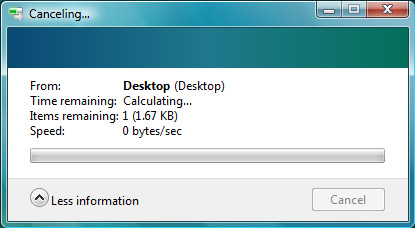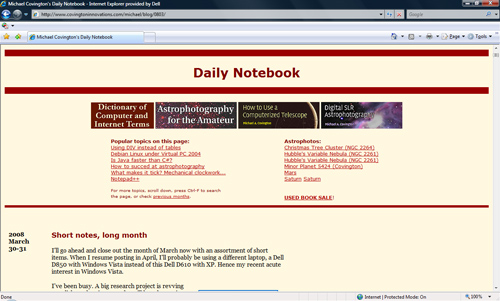|
2008 April 28-30 |
Closing out the month... I'm closing out this empty month with a few short items... The e-mail problems seem to be over; I haven't seen any further signs of trouble. What's really wrong with Windows Vista: Hardware and software manufacturers decided in advance that Vista would never amount to much, so they didn't bother to support it properly. Niklaus Wirth (inventor of Pascal) has developed a programming language for PIC microcontrollers. Now that's a promising idea. Why I am not a rich consultant: I keep telling people, "Although I could take your money for that, it's not really what you need — instead, you should get such-and-such other consultant to do such-and-such work, at much lower cost." I've done three of those in the past two weeks... See you in May! |
|
||||||||
|
2008 April 27 (Extra) |
E-mail problems continue [Not!] At least one e-mail message sent to a covingtoninnovations.com address was bounced as undeliverable on the evening of April 26, due to lack of DNS service. I presume Sectorlink is moving mail.covingtoninnovations.com to a new server. [Update: No, the joke was on me. I had misspelled Melody's address and gotten it into the autocomplete buffer of Windows Mail. Then, every time I started to type it, the misspelled address was automatically filled in for me. There's nothing wrong with the e-mail system at all.] |
|
||||||||
|
2008 April 27 |
Something for Economics 101 [Minor revisions Apr. 27, 28.] Tonight's [Apr. 26] question on The Suze Orman Show is: Why do "green" (environmentally conscious) mutual funds have higher load and management fees than ordinary ones? The answer is too obvious: Because people will pay them. Admittedly, the manager of a "green" fund has to dig up information beyond ordinary financial data, and that legitimately adds to the cost. But my point is that people are willing to pay this cost. I'm in favor of environmental responsibility. But I think it should be integrated into the workings of the market economy, not promoted as an extra-cost premium. I'm put off by the way "environmentalism" so often consists of inefficient and wasteful rituals such as washing bottles by hand before recycling. These things exist largely to make people feel that they are doing good, not to accomplish anything efficiently. Let's "save the earth" by making it cost-effective to do so! |
|
||||||||
|
2008 April 25-26 |
Short notes I'm too busy to write much, but here are a few things... Agfa Rodinal film developer is again being manufactured, and is available from, among other vendors, Freestyle. This product has been on the market since, I think, 1891, and is very versatile. Another company has purchased the rights to the formula and the trademark. I'm going to be in the Athens Banner-Herald next week; they interviewed Don Potter and me (and other people separately) about technology and the future. The photographer comes Monday and is said to be very creative. Hang on to your hats... By the way, my take on predicting the future is that many predictions don't come true. We didn't have a nuclear holocaust around 1975 or an ecological catastrophe around 1990. Nor do we have flying cars; private aviation exists but hasn't changed much for 50 years. On the other hand, who would have predicted that computers are used mainly for non-mathematical purposes? |
|
||||||||
|
2008 April 24 |
E-mail outage at covingtoninnovations.com [Updated] Due to a hardware failure at Sectorlink, covingtoninnovations.com lost e-mail service around 11 a.m. on April 23 and regained it in late evening. If you tried to send me anything important during that period, you may want to re-send it. The Emory-at-Oxford zebra caper When Oxford College of Emory University woke up this morning, there was a zebra inside Seney Hall (the administration building). Sharon didn't do it; she was actually here at the time, having spent the night at home in order to tend to some personal obligations in Athens. |
|
||||||||
|
2008 April 22-23 |
Institute for Artificial Intelligence On April 22 the University Council (of the University of Georgia) approved changing the Artificial Intelligence Center into the Institute for Artificial Intelligence. It's basically a matter of nomenclature — the kind of unit that we have been for a long time is now called an Institute — but an honor nonetheless. If I'm not mistaken, the actual changeover date is July 1. A cheering thought The gas station warns us that our gasoline "may be up to 10% ethanol." Well, although I don't think diverting corn crops to make fuel is a good idea, there is one benefit. The ethanol will presumably get rid of any water that is in our gas tanks. Incidentally, if you need small quantities of methyl or isopropyl alcohol for use as solvents, they can be purchased at auto parts stores as Heet and Iso-Heet respectively. I haven't checked whether the methyl version is pure enough for cleaning optics. [Apparently not, to judge from the MSDS.] Pure methyl alcohol is a great lens cleaner. Being a smaller molecule, it is a slightly stronger solvent than ethyl or isopropyl alcohol. |
|
||||||||
|
2008 April 21 |
Miscellany If you suffer from vertigo (which, I hasten to add, I don't), you might find the medical information on this page useful, especially the exercises to reposition loose particles in your inner ear. But don't watch the animation on the opening page. Some of my astrophotos are now on display in the dental office of Dr. Brian P. Hall. Go and admire either the pictures, or the CEREC machine, which can make crowns and other ceramic reconstructions immediately, so you can have the whole job done in one day. (None of my teeth has needed that, yet, but I'm impressed by the use of CAD/CAM.) |
|
||||||||
|
2008 April 20 |
The colorful moon These pictures were taken through the same telescope as the ones posted yesterday, on the same evening, but they differ in two ways. No Barlow lens was used, so the magnification was only half as much. And the color saturation was greatly increased during digital post-processing, so that you can see subtle color differences greatly exaggerated. Not all moon rocks are exactly the same shade of gray. Be warned that some of the color differences are probably the fault of the camera, which tends to render brighter objects reddish and fainter objects greenish.
The fallacy of elevating the complement Congratulations to Clayton Darwin, who completed his Ph.D. in linguistics on April 18; I was on the committee. His thesis was about the creation of the Tobacco Documents Corpus, a data base for the study of deceptive language. Along the way, he made some interesting methodological points. One of them is that the complement of a meaningful category is not necessarily a meaningful category. That is, "frogs" might be a scientifically useful category but "non-frogs" is not. Even "amphibians that are not frogs" is shaky. If you want to compare frogs to something, compare them to salamanders, or to fish, or to some other category that is equally well defined. The same principle applies when you're comparing statistical samples of any type. The mistake of treating "non-X" as a category is known as elevating the complement (Dr. Darwin's term). Keep your eyes open for it. |
|
||||||||
|
2008 April 19 |
Uploaded early! Read tomorrow's news today!
Philips ToUCam Pro (740) under Vista [Updated July 17.] Symptom: A Philips ToUCam Pro (740) has been installed under Vista using Philips' improvised Vista drivers. Some of the camera settings are not available. Specifically, the "Video Capture Filter" window that sets frame rate and exposure will not pop up. Solution: You will need two files from your original Philips ToUCam installation CD, namely Camdsh20.inf and camext20.ax. Actually, these files come with Philips' improvised Vista driver also; they just don't install properly. So check whether you already have them before digging out that CD. Do the following: (1) Make a folder on your desktop and put these two files in it. (2) Open a Command Prompt as Administrator (i.e., right-click on the Command Prompt icon and choose Run as Administrator). (3) CD to the folder you just created, and run the command: rundll32 advpack.dll, LaunchINFSection camdsh20.inf, phdsext.registration.740 Actually, you might want to copy that command onto a file named GO.BAT, put that file in the folder with the other two files, and launch it (Run As Administrator). Explanation: Philips apparently left something out when distributing the improvised Vista drivers, or maybe they failed to install on my PC for some reason. Thanks to AZscendant for figuring this out; click on the link to learn lots more about how to make a ToUCam work under Vista. And the Vista laptop can see Saturn...
Here are the first two astrophotos taken with my new (University-owned) Vista laptop, after going through the aforementioned procedure with the ToUCam. These were taken through an 8-inch telescope with a 2x Barlow lens. Each is a stack of about 1700 video frames, selected as the best from a somewhat longer sequence. They are different sizes because of subsequent digital processing. |
|
||||||||
|
2008 April 18 |
Old engines and new computers What do 1973 cars have in common with today's PCs? Both are burdened by defensive technology. In 1973, due to suddenly imposed regulation, American cars had heavy and inefficient pollution-control equipment that greatly reduced their performance. Today, it's antivirus software. We need a totally new approach. What will be the computational equivalent of the catalytic converter? Has marijuana (cannabis) ever killed anyone? This entry is written primarily for people who will find it through search engines. Regular readers know of my involvement in brain research and have seen me mention some of these research results already. Activists from NORML were on campus today, spreading their mantra that "marijuana has never killed anyone" or "marijuana has never caused a death." Which, of course, can't possibly be true. They were displaying a chart something like this:
Except for the last one, I'm probably not remembering the numbers accurately, but you get the idea. If you believe this chart, you've failed an intelligence test. If they had quoted a low death rate for marijuana, they might possibly be reporting the results of a real study. But as long as they say zero, they're in the realm of total incredibility. Note: I am not talking about whether present American drug laws are wise; I'm only talking about whether marijuana has ever killed people. It has. First, consider car crashes. Or is NORML claiming that when stoned people crash their cars, they don't die and neither do their victims? For confirmation that marijuana kills people on the road, see this and this. And note the words "post mortem evidence" in the account of the New Zealand study, about which you can read in full here. Finally, note that this is a drug that lingers in the body for days after use, continuing to have a measurable effect. Then there's severe mental illness. I personally have known 3 people who became severely mentally ill after they started smoking pot, and 2 of them killed themselves. There is now quite a bit of research connecting marijuana with increased risk of psychosis. And psychosis does get people killed — the suicide rate among people with schizophrenia is high. Note by the way that marijuana is addictive and produces physical withdrawal symptoms — look at the medical literature. (See this and this for instance.) This is a fairly newly recognized phenomenon; ten years ago it wasn't in the textbooks, but now we know it's real. It may indeed be impossible to overdose on marijuana by smoking it, partly because the drug would render the victim unconscious (hence unable to take more) long before a lethal dose had been reached, and partly because that lethal dose is very large (unlike, say, opium). And that fact may be the source of NORML's oft-repeated nonsensical claim. But why trust the pro-marijuana activists anyhow? They say foolish things, and they are almost certainly working to promote America's multi-million-dollar illegal drug industry, which is rich and powerful even if it's illegal. If we don't trust the tobacco industry, why should we trust the marijuana industry? |
|
||||||||
|
2008 April 17 |
Vintage Valiant My first car was a forest green 1973 Plymouth Valiant. I took a few pictures of it, which I'll dig up eventually, but Carlos Pomares has outdone me. He found one in New Jersey — alive and running in the 21st Century with only 26,000 miles on it — and it's the same, rare color as mine! Click on the link. My recollection, by the way, is that the 1973 Valiant never ran well because it was so burdened by pollution controls (many of them peculiar things that were required by law only on 1973 models). That was in the days of EGR pumps and the like, not catalytic converters, and no consideration was given to the idea that the best way to make less pollution is to burn less gas. More Plymouth Valiant history is here. |
|
||||||||
|
2008 April 16 |
Fixed! The two Vista problems that I reported on April 2, namely:
turn out to be caused by two more problems that I also noticed at the time:
To be precise, SearchIndexer.exe was holding files open and not letting other processes delete them. SearchIndexer does some pre-indexing to help you search for files on your computer. Turning it off does no harm — it just makes searches take longer. (But in the meantime you have more CPU cycles for more important things.) This particular bug may be peculiar to Vista SP1, or peculiar to dual-core CPUs, or both. The proper and efficacious way to turn off SearchIndexer is the following:
I want to thank graduate research assistant Tony Snodgrass for the diagnosis and repair. I'll be using the new laptop again soon. Others have written a few things about problems possibly related to this. See this and this. Also, the problem may be an interaction between SearchIndexer and McAfee Security — I just don't know. Idea (not yet tested): On this computer I think we followed our normal Windows 2000 and XP registry tweak to broaden the range of files that are indexed (see this). That may be what drove SearchIndexer crazy. We're going to check. Meanwhile, everybody else be on the lookout for either of 2 things: (1) Windows Update may fix SearchIndexer.exe; or (2) Windows Update may put SearchIndexer.exe back the way it was (i.e., reactivate it without fixing it). You never know. |
|
||||||||
|
2008 April 15 |
Farewell to a familiar face
On April 14, our traditional kilowatt-hour meter was replaced with a digital one. So our house no longer has one of the most recognizable traditional electrical components. This meter is actually a kind of analog computer invented in 1888. Its job is to compute the integral of voltage times current. Integration is done by turning a clockwork dial mechanism and reading how far the dials have turned. Multiplying voltage times current is harder; it's done by energizing a simple, slow motor with two coils, one with very low resistance and wired in series with the whole house, the other with high resistance and wired in parallel with it. The rate at which the motor turns tells you how much power is going into the house. It's not enough to measure just the current, because the voltage varies. An amp at 120 volts is 120 watts; carry it on for an hour, and you've used 0.120 kWH. But if the voltage is 125, then an amp is 125 watts, and so on. The meter itself consumes about 2 watts (i.e., 0.002 kWH per hour). I don't know if this is mostly upstream or downstream from the meter. The new digital meter probably consumes considerably less than that. In a year, we may save a few cents. |
|
||||||||
|
2008 April 14 |
Antivirus software will be the death of us all It is becoming fairly clear that at least part of what's wrong with my malfunctioning Vista laptop is due to McAfee Antivirus. [Actually, it apparently wasn't. Apr. 17, 2008] Meanwhile, we just now encountered serious network communication failures on Melody's home computer which were resolved by turning off all web protection, including Proxy Server, in Kaspersky Antivirus. Proxy Server is a different setting than Web Protection. And if you've been reading this notebook long, you've heard about my battles with F-Secure Antivirus. This is getting ridiculous. We need operating systems that are intrinsically more secure (Vista is a step in the right direction). We need vigorous prosecution of those who create and distribute viruses (nearly all of whom are now acknowledged to be aiming at serious crime, not just mischief — although I was laughed at for using the words "organized crime" in connection with computer cracking the 1990s). And we need a more secure Internet. And for people who are fool enough to require a totally virus-proof computer, we need a computer that does nothing and hence can't get infected. I'm only half kidding. A computer with the web browser in ROM, and no permanent file space, would meet a lot of people's web browsing needs, and it would be un-infectable. For the rest of us — I'm increasingly coming to prefer lightweight antivirus programs such as AVG. I don't get viruses, anyhow. I don't surf for porn, I don't download things just to see what they'll do, and I don't click on every "amazing offer" that pops up. I do want a virus check of every downloaded file, but I'm tired of wasting huge amounts of CPU time and my time guarding against the viruses that aren't there. By the way, the case for using a minority operating system (MacOS or Linux) is that there are a lot fewer viruses. Speaking of which, here is a diabolically clever idea. Replace Microsoft Windows with half a dozen different operating systems with identical APIs (thus all able to run the same software) but different kernels, and different low-level security. Then everyone would be running a minority OS. |
|
||||||||
|
2008 April 12-13 |
Two quick notes I'm still very busy but have recently had some fun playing with an Imperial College Body Sensor Network. This is a group of tiny computers (each the size of a stack of 3 quarters) which communicate with each other wirelessly. They're small enough to be worn on the human body, hence the name. Typically one is connected to the USB port of the host PC, with which it communicates, and the others are powered by 3-volt coin cells. They are programmed in NesC, a language I haven't gotten a grip on yet; it's an event-driven extension of C. We may use them in an engineering course in a couple of years. A certain member of Congress keeps making automatic recorded phone calls to my house almost daily, to take "surveys" or invite me to participate in "forums." That's a good way to lose my vote. It happens to be legal if done by a politician, but not if done by anybody else. There may be legitimate reasons to exempt politicians from certain laws, but only if they're going to have the good sense not to do exactly the thing that the laws were made to prevent. |
|
||||||||
|
2008 April 10-11 |
Busy season Things are going well with my research, but entirely too much is going on at one time, and I won't be writing Notebook entries regularly for a few days. One bit of news: I finally got around to testing Windows Services for UNIX against Cygwin, and the latter seems to be a more authentic UNIX environment. At least, it compiles and runs the original Brill tagger, which the former did not do, at least on my first try. I'm sure the reason is trivial, but the point is, we rely on implementors to get the trivia right. Somehow — a few years ago — I had gotten the impression that Cygwin was clumsy to use, so I didn't use it. Now it's fine. Another: Is it true that there are no Macintosh viruses? Not quite. Viruses for the Mac do exist. There is less of everything for the Mac — both viruses and legitimate software — because the Mac is less popular and thus a smaller target. On the other hand (sad to say) Mac users tend to be considerably more naive about security and are more vulnerable to "social engineering" (phishing and hoaxes). Or so I'm told by the experts. |
|
||||||||
|
2008 April 9 |
A bothersome non-virus This evening, F-Secure Antivirus kept telling me that I had a virus, known as Trojan:W32/Agent.EOT, in the file C:\Windows\SYSTEM32\Upgrd.exe. I told F-Secure to delete the file, which it did, and the file kept reappearing. So I renamed the file (making it non-executable) and looked at it with Notepad++ and other tools. It turned out to be a DOS (not Win32) executable that contained, inter alia, the following commands: del %s\rpcnet.exe move %s\NTAgent.exe %s\rpcnet.exe rpcnet -i net start rpcnet del %s\Upgrd.exe del %s\Upgrd.bat Looks bad, doesn't it? It turns out rpcnet.exe and its kinsmen rpcnet.dll, rpcnetp.exe, and rcpnetp.dll are all parts of Computrace Absolute Track, which the University had me install in order to help recover this laptop if it's stolen. Presumably, it's trying to update itself on line. Now for the scary part. Reportedly, if Absolute Track is tampered with, it will delete all the files on the computer. I'm glad I didn't start whacking the "rpcnet" files before finding out what they are! But on the other hand, what better place would there be to hide a virus? Essentially, Absolute Track is a virus, a benign one which we put on the computer deliberately. If a malicious virus were substituted for it, who would know? Having no choice, I did two things: (1) Configured F-Secure not to scan that particular file (upgrd.exe); (2) Asked the helpdesk how to safely deinstall Absolute Track. This laptop doesn't contain personal data anyhow. I don't understand people who, in the business world, travel with great gobs of customers' confidential data on their laptops. |
|
||||||||
|
2008 April 8 |
Phottix exposure timer
I do not have any further information about this or other Phottix products. Please contact the vendor or the manufacturer if you have questions. |
|
||||||||
|
2008 April 7 |
Forest One of the best things about our trip to Middle Georgia on Saturday was seeing all the pine forests with dogwood trees peeking through, like this:
Economic factoid After carefully calculating the effects of income tax, other taxes, and the effects of the sliding-scale college financial aid system, I can report that Ben Franklin was not quite correct. The exact figure (for us) is: A penny saved is 1.46 pennies earned. Now you know. |
|
||||||||
|
2008 April 6 |
Ad astra per aspera Yesterday's (Apr. 5) trip to speak at the Georgia Sky View was a bit of an adventure. In the first place, the Sky View coincided with a weekend of much-needed heavy rain — much-needed by everyone but the astronomers, that is. And second, our 1995 Dodge minivan decided to throw a belt during the drive. It has one serpentine belt that powers nearly everything. I drove through a puddle, which apparently triggered the problem, and immediately noticed the power steering getting stiff. The battery-charge and check-engine lights also came on. Melody and I made it to a farmhouse, which fortunately turned out to be occupied by a retired University of Georgia employee, and what ensued is best told in pictures:
And finally, after phoning to change the scheduled time of my talk...
My opening words were, "Some people are ahead of their time. I am the opposite..." My hat is off to Madison Car Care (Madison, Ga.), because in the space of 45 minutes on a Saturday afternoon, the tow truck was called, the car was towed in, the belt was checked immediately by two mechanics, two new belts were ordered (if you're replacing any, you might as well replace them both), the belts were delivered by NAPA, the belts were installed, and we were on our way, all at a very modest price. This, even though they were supposed to be closed at the time. It was like a trip back to the world of Gus the mechanic. |
|
||||||||
|
2008 April 5 |
"But the computer let me!" "But the computer let me!" is one of the oldest excuses in computer security. Some people assume the computer must physically block them from doing anything improper, and if something isn't blocked, it can't be wrong. This used to be an excuse for snooping in other people's files on multi-user computers. Nowadays it seems to have become an excuse for installing Vista Upgrade without a valid license. Click on the link I just gave you for a sensible explanation by Ed Bott. Yes, it is physically possible to install Vista Upgrade even if you're not upgrading (i.e., you don't have a previous version of Windows). That doesn't mean the license permits it. The reason it's physically permitted is that sometimes, you might have a valid upgrade license and not have the older Windows media around to prove it. Tomorrow (today, April 5, as you read this) I'm off to speak at the Georgia Sky View. Come one, come all... |
|
||||||||
|
2008 April 4 |
Something to make me feel young, for a change
This came in the mail today. Maybe I'm not as old as I look! My address is partly deleted here, not because I'm in hiding, but because I'm shy. |
|
||||||||
|
2008 April 3 |
Short notes The malfunctioning Vista laptop about which I wrote yesterday is almost certainly going back to Dell for hardware testing. We strongly suspect a gradually failing disk drive. Additional malfunctions developed as I was trying it out today, and System Restore doesn't undo them. Here is someone who foresaw computer privacy issues 41 years ago. I just wish people had listened. In the 1960s, managers trusted computers ("electronic brains") and thought they were smarter than humans. ("Computers never make mistakes.") |
|
||||||||
|
2008 April 2 |
A cold plunge into Vista troubleshooting
We have two Vista computers that run just fine, but the third one, the new laptop, is the charm — or rather the opposite. At some point while I was installing software, it came down with a strange malady, or rather two of them: (1) Windows Mail does not actually terminate when the user exits. The process keeps running and it is not possible to start another instance until the first one is killed off manually in Task Manager. There is no error message — Windows Mail just won't start. Two people have told me this is caused by McAfee Antivirus, but I don't know. (2) It isn't possible to delete files through the GUI (Windows Explorer). Deleting files from the command line works just fine, but any attempt to delete a file from the GUI causes this "Recycling 1 item" message to appear and stay on the screen, frozen (rather than go away after a second):
There is of course a variant with "Deleting 1 item" if I do a Shift-Del. If I click "Cancel" or the close button, it changes to this, but remains frozen:
The box only goes away when I kill it with Task Manager, causing Explorer to restart. In general, the file does get deleted. System File Checker finds nothing wrong. Scandisk finds nothing wrong. Turning off UAC makes no difference. Windows updates are up to date (and I have tried quite a few System Restore points, including several from well before the problem appeared). I assume some part of Windows got corrupted without System Restore knowing about it, or maybe the Recycle Bin got corrupted. I'm going to try removing McAfee Antivirus and switching to AVG. But first, I am of course running a virus scan with McAfee. And if that doesn't work — time to wipe and reinstall. But I wish I knew what was causing the problem! A third curiosity is that ScanIndexer.exe is running at 50% CPU (100% of one of the two cores) even though Control Panel reports that the Indexing Service is not running. What gives? Update: Because this is a relatively new laptop with increasing software problems that don't go away with System Restore, the leading diagnosis right now is actually that the hard disk may be failing. I've also had 2 bluescreens of unknown origin. Accordingly, the hardware is about to get a real shakedown, or the computer may just get sent back to Dell for diagnosis. |
|
||||||||
|
2008 April 1 (Extra) |
550 error, "No such user here", sending e-mail Are we approaching the time when we won't be able to use Outlook, or Windows Mail, or any other mail client software, and will only be able to send e-mail through our ISP's web interface? I ask because of the accumulation of restrictions I have to fight with. I use Outlook Express (a.k.a. Windows Mail), which, for all its faults, is quick and simple. And last night, setting it up on my new laptop, I ran into a problem. First, the background to the problem. My DSL provider, Bellsouth, provides me an e-mail address that I don't use. My non-University e-mail goes through covingtoninnovations.com, which is hosted by Sectorlink. My University e-mail of course goes through uga.edu. And as you know, e-mail normally goes out through TCP port 25. And as you also know, most spam is sent by software secretly installed on innocent victims' PCs, sending out its own garbage through TCP port 25. Accordingly, most ISPs, including Bellsouth, won't let you connect through port 25 to any server but their own (so they have some control over their network). Conversely, you can't connect to Bellsouth's outgoing server if you're not on a Bellsouth DSL line. In fact, my Bellsouth account may only work from my house; I'm not sure. Fortunately, Sectorlink provides an alternative outgoing mail port, with a secret number which can be changed on short notice if there's a problem. Accordingly, I set up my Sectorlink account to both receive and send mail on Sectorlink. No problem. It works the same way no matter whether I'm at home or at work. University of Georgia e-mail is more of a problem. It comes in on uga.edu, but I can't send mail out on uga.edu unless I'm on campus. So I cleverly set up my account to receive on uga.edu and send on covingtoninnovations.com, through Sectorlink's secret port. Clever, right? Wrong. Whenever I tried to send e-mail, I got error messages like this:
The message could not be sent. The authentication setting might not be correct for
your outgoing e-mail [SMTP] server. ... (Obviously, xxxxx@yy.edu was not really the destination; it was the address of a colleague at another university, and I'm sure it was correct.) This is a highly misleading error message. It seems to say any of the following things:
The real problem? Sectorlink won't accept mail whose "From:" address doesn't refer to a Sectorlink site. This is another anti-spam strategy. I was using my uga.edu "From:" address on my mail, since of course I want people to continue the conversation by sending to uga.edu. My solution? At least for now, my uga.edu address is in the "Reply-To:" field but my covingtoninnovations.com address is in "From:". This may cause an entirely different set of people to think I'm a spammer — we'll see. But at least some of the mail gets out! My exhortation to the world? We sorely need a secure e-mail system, but let's make sure it's usable! |
|
||||||||
|
2008 April 1 |
A move toward the center Readers with wide screens will notice a move toward the center. And I'm not talking about my politics. Starting this month, the Notebook does a better job of staying in the middle of the screen. Readers with unusually narrow screens will notice that the text still fits where it should, but the banner at the top no longer shrinks to (try to) fit the browser window. In short, we've been widescreen-proofed. The old look:
The new look:
This was done by making just two changes to the web page:
Change
Change Each of the items to be changed occurs only once on the page. After I've fiddled with the width settings a bit, a similar change will pervade this web site (but probably not the Daily Notebooks of the past). I may even write a program to make the changes. Most of Covington Innovations will be 725 pixels wide, which was its original design width, rather than 900; the Daily Notebook accommodates wider pictures fairly regularly. Update: This only works with IE 7. For a Firefox-compatible solution, click here. Has the {McCain, Obama, Clinton?} administration begun? The firstfruits of the post-Bush era may be the new plan for regulating the financial industry. Too much has been slipping through too many cracks for too long. The new plan is not expected to be fully in place until after Bush leaves office. It doesn't seem to be there yet, but you'll soon be able to read all about it at the Fed's web site. As I keep saying, maximum freedom comes from the right amount of regulation, not from the absence of regulation, which merely puts power in the wrong people's hands. Can't uninstall Norton Antivirus? The other day we changed our home server from Norton Antivirus to Kaspersky Antivirus. Uninstalling Norton 2006 was a challenge; during uninstallation, it demanded the original installation CD, which we don't have because we bought it as a download. It turns out that this problem is so common that Norton (Symantec) publishes a utility to uninstall all their products. Get it here, and write down your product activation codes before uninstalling, in case you ever need to reactivate the same products. |
|
||||||||
Entries are most often uploaded around 0000 UT on the date given, which is the previous evening in the United States. |







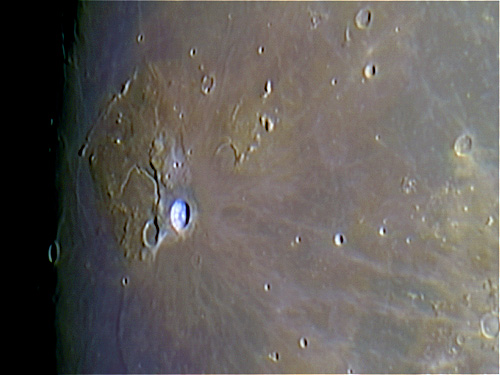

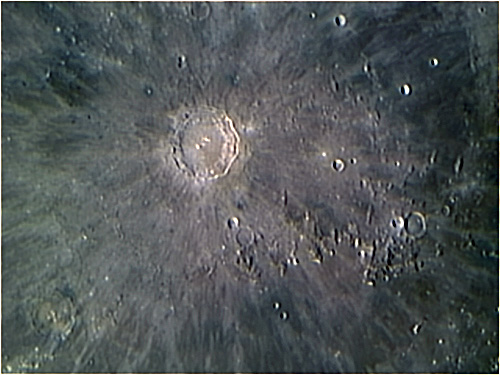


 My latest astrophotography gadget is a Chinese-made
My latest astrophotography gadget is a Chinese-made



